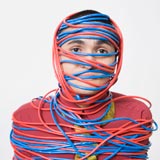New Media LiteraciesNew Media Literacies
 Exploring the Changing Digital Media Landscape with ESL Students
Exploring the Changing Digital Media Landscape with ESL Students
As technology transforms the way students learn, they increasingly become producers as well as consumers of media. What are the implications of these changes for teachers and their students?
What do they know about you?
What do we know about them?
What Do They Know About You?
Social media present students with questions about privacy and safe practices online. What are the risks of creating an online social presence? Who knows what about you? What do they do with it?
Lesson Plan 1
What Does the Public Know About You? --Does it Matter? (PDF)
Take the Digital Privacy Quiz and see how you fare
Lesson Plan 2
How Cyber-Bullying Happens and How to Stop It (PDF)
Lesson Plan 3
The Stakes are High - Is Speech Free in Today's Digital World? (PDF)
Take the First Amendment Quiz online
Find more videos like this on The Educator's PLN
Every move you make - who is watching you?
Kind permission of Steve Johnson
 What Do We Know About Them?
What Do We Know About Them?
Internet access offers a constant onslaught of information. What is important? What is trivial? What are the challenges facing students in determining the credibility of sources?
Lesson Plan 1
Information Overload: Looking at News (PDF)
What are the challenges facing students in determining the credibility of sources? How do you distinguish between open source and mainstream sources, such as news networks, academic sources etc?
Lesson Plan 2
Is Social Media a Trustworthy News Outlet? (PDF)
During this time of upheaval in the Middle East, labeled by the media "Arab Spring," has social media — e.g. Facebook and Twitter — offered reliable sources of information? Which sources do the public trust more — social media sites or the mainstream media?
Lesson Plan 3
Credible Sources on the Internet: What to Trust, What to Dismiss and When to Cite a Source (PDF)
Navigating the digital world is proving to be a daunting task with the advent of new media. Students need the skills to discern what is valid from the abundance of information on the Internet. They need to develop critical thinking skills to look with a discerning eye at this information and assess credible and reliable sources.
Lesson Plan 4
Who is the Expert? Exploring Credible Sources in Healthcare (PDF)
The Internet has changed the way that we research information for our daily needs. Considering the wealth of resources online and the fact that anyone can publish online, when faced with a health question or problem, how does one find credible sources for support, diagnosis and/or treatment?
Lesson Plan 5
Distracted by Everything - Being Wired at All Times (PDF)
Should students have access to cell phones and laptops in class? Do they need to be wired at all times? Is it possible to learn while multitasking?
Watch Digital Nation on PBS. See more from FRONTLINE.
Resources
Privacy in the Digital Age
- What Does the Public Know About You?
- The Web Means the End of Forgetting
- Private Moment Made Public, Then a Fatal Jump
Tyler Clementi killed himself after an intimate encounter was broadcast. - Direct Marketing Association in San Francisco
"We have more information about your hopes, dreams and desires," Kimmel said. "When you put it all together, we could make you happier." - Smart Cookies Put Targeted Online Ads on the Rise
Cookies tell advertisers just what they want to know to sell a product. - Tracking the Companies that Track You (Audio)
How to block the cookies on your browser. - Take Control and Stop Cyber-Bullying
- Warrantless Cell Phone Search and Data Privacy
- Digital Privacy Quiz
- Digital Footprints
Social Media
- A Facebook Fiasco
- Facebook: Friend or Foe
- 11 Tips on Avoiding Social-Networking Gaffes
- Another Day on Facebook
- Friend a Student, Get Fired
- Unlike Tyrants, The Revolution May Not Be Digitized
Authoritarian governments can harness the Internet's power to serve their purposes as well. Some use it for surveillance, "tracking down what's happening on social networks, trying to identify who are all of those people tweeting." Others use the web to distribute propaganda. - Frontline's Digital_Nation Life on the virtual frontier
Where we are headed? What does the future look like?
Student Surveillance
- Don't Let Schools Chip your Kids
"Tagging ... kids becomes a form of indoctrination into an emerging surveillance society that young minds should be learning to question." - Should Tracking Devices Be Used with Students?
Cybercrime
- Joseph Menn, author of "Fatal System Error," discusses cyber-security.
The recent Wikileaks scandal saw the release of thousands of classified government documents, inciting controversy and sparking new concerns about cyber crime. - Listen to a KQED Forum discussion on cybersecurity